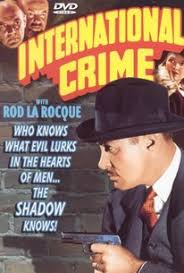
Lamont Cranston (Rod La Rocque) is a reporter for the Daily Classic newspaper. He pens a column called “The Shadow Says:”. He also hosts a radio news program sponsored by the paper that reports news stories about crime. Cranston has a tendency to upstage Police Commissioner Weston (Thomas E. Jackson). During one radio report he is handed a tip about a robbery that is supposed to take place at the Metropolitan Theater at eight o’clock.
The scoop comes from a new assistant, Phoebe Lane (Astrid Allwyn). The only reason she is there is due to the fact that she is the owner’s niece. He learns that the tip came from a random stranger. Phoebe believed it was a legitimate tip because the guy who gave it to her had “an honest face”. It turns out the tip was a ruse to get the cops away from the real target.
International Banker Gerald Morton is killed and his safe appears to be robbed. Police Commissioner Weston (Thomas E. Jackson) believes the safe was robbed by a safe cracker named Honest John who had just been released from prison. Cranston believes that the robbery was a cover for the murder of Morton. Honest John wants Cranston to exonerate him. Tired of being upstaged the police want Cranston off the air.
Cranston and Phoebe make the rounds at the various nightclubs looking for the man that gave her the tip. Eventually Phoebe points out a man named Flotow (Wilhelm von Bricken) as the gentleman in question. He is having dinner with Starkov (Tenen Holtz). Cranston tries to pass himself off as an Eastern European visitor to find out why they wanted Morton dead. Phoebe, of course, messes things up and Cranston finds himself deep into speculative bonds and revolution.
“International Crime” was released in 1938 and was directed by Charles Lamont. The movie is a murder mystery/comedy. It is a low budget poverty row film produced by Grand National Pictures.
This may be one of the earliest depictions of The Shadow character in film but don’t look for the usual caped crusader with the maniacal laugh. In the movie the names Lamont Cranston and The Shadow are used, but they have nothing to do with the original radio program “The Shadow”. It’s not even a direct sequel to “The Shadow Strikes” 1937 that was released in the previous year. In that film Cranston was a lawyer, here he is a reporter and amateur sleuth and The Shadow is just a pen name.
Supposedly the film is based on a story called “Foxhound” published in 1933. Perhaps some of the character names are the same but as for the plot, very little of it translates from the original Shadow character to the one used in the “International Crime” version of the story.
Comparing it to “The Shadow Strikes”, it’s not as good. Looking at it as just a murder mystery it’s about average for the thirties. Just about everyone is comic relief but the main one is Phoebe the assistant wanna be reporter. The movie spends so much time on her and her character that the actually mystery part gets a little lost. Don’t be surprised if, by the end, you’re saying to yourself, “Why did they kill Morton?”.
As the “The Shadow” it isn’t. As a sequel to “The Shadow Strikes” it ain’t. If you’re looking for a better representation of the radio character “The Shadow” you might want to try the serial “The Shadow” 1940 with Victor Jory. Again, it’s not totally the radio or pulp fiction character but it is a lot closer than the first two movie attempts.

